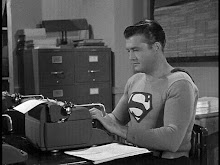An actor friend of mine recently accepted an offer to do a summer Shakespeare festival, but she balked at the actual contract they sent her. It had an elaborate confidentiality agreement, as well as certain clauses in the contract that she wasn't sure about. She tried to discuss it with the company, but they told her that no changes could be made to the contract, and she would have to sign it as is. When she was telling me about it, I started thinking about previous contracts I had signed for different companies I had worked for. Most of the time, the contracts were simple one-page documents outlining payment and dates of employment, with almost no more specifics at all. But twice, they were long documents outlining all my responsibilities and expected code of conduct while employed with that theatre.
The first time I got such an elaborate contract, it was a very well-balanced deal, with protection provided for both company and actor in case of a difference between them. By signing it, I promised that I would behave in certain ways and perform certain tasks, but it also guaranteed that the theatre would behave in certain ways and be held to certain standards. It accounted for everything, and I signed it without further negotiation.
The second time I got an elaborate contract, it was much more heavily weighted in favor of the theatre company. I too balked at some of the provisions I was being asked to agree to, and I wanted to change some of the wording in the document as well as negotiate some of its points. I called the company office with a very specific request to discuss the contract. After trying for three days to speak to the correct people, I was eventually told that the changes I wanted were impossible, as they were not company policy. I didn't know if it was company policy to not change the contract, but I was forced to sign it with those less-than-favorable clauses intact. I enventually had a much larger debate with this company over contract matters, but that's an entirely different topic.
How much power do we actors have in these contract negotiations? In reality, the answer is not very much. There are a hundred other actors out there who are more than willing to play the roles that we give up because of contract reasons, and the theatres out there know this. That is one of the chief reasons to have an agent/manager, in my opinion. They can negotiate and discuss the specifics of employment without running the risk of alienating the theatre while they do so. The agent is simply looking out for the best interests of their client, which is something that all actors should be given the freedom to do. We need to learn how to ask for changes, negotiate, and not take "no" for an answer when we think the theatre company manager is just trying to sweep the problems under the rug. By and large, theatre companies do not take advantage of the actors that work for them. But if we run across that rare exception, we should have taken the time and had the courage to re-negotiate a contract that protects us.
Subscribe to:
Post Comments (Atom)

1 comment:
on the lighter side: a "confidentiality clause" about Shakespeare plays ... what - are they changing the endings?
Post a Comment